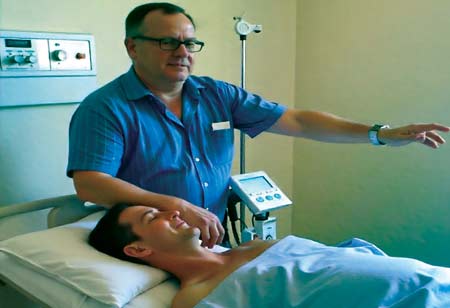Thank you for Subscribing to Healthcare Business Review Weekly Brief

Breathing New Life into Rural Respiratory and Sleep Services
Healthcare Business Review
Susan Wynn has led respiratory and sleep services at Schneck Medical Center since 1989, bringing over 40 years of experience to the role. She began her career at Schneck in 1981 as a student respiratory therapist after discovering the field through a job shadowing opportunity. Promoted to assistant director upon graduation, she quickly advanced to director.
Committed to lifelong learning, Wynn has earned an AS in respiratory therapy, a BS in business administration, a master’s in management and a BS in respiratory therapy. She pursued these degrees while working full time, driven by evolving clinical standards and her dedication to excellence in care.
Under Wynn’s leadership, Schneck’s respiratory and sleep services have expanded significantly. She remains focused on clinical excellence, education and adaptability, which are critical in a rural, underserved setting and is widely respected for her expertise and dedication.
Advancing Clinical Excellence in an Underserved Community
Schneck Medical Center is a high-performing, independent and fiscally strong acute care facility that has expanded to include physician clinics, an urgent care center, a cancer center and other services. As a rural hospital designated as an “underserved medical community,” Schneck faces ongoing challenges in keeping staff educated and up to date on emerging technologies and treatment modalities. To address this, Wynn has taken an intentional approach to professional development. She has applied for and obtained grant funding to ensure team members have access to AARC Explores, a digital training series that offers 8–10 hours of annual continuing education focused on advancements in respiratory medicine.
You can’t sit back and wait for solutions to appear. You have to actively pursue them, explore new resources and commit to executing your vision
In addition, Wynn’s involvement on the Indiana Society for Respiratory Care (ISRC) board—on and off since 1992— has created valuable opportunities around professional development. This engagement not only strengthens educational efforts but also enhances Schneck’s visibility in areas such as sales, education and recruitment—benefits that would be difficult to achieve without that level of professional involvement.
Turning a Staffing Crisis into a Strategic Opportunity
One of the biggest challenges Wynn faces as Director of Respiratory and Sleep Services is staffing. The national shortage of Respiratory Therapists was already taking shape before the COVID-19 pandemic hit in 2020, but the crisis significantly magnified the issue. During that time, therapists were being offered astronomical salaries to travel for work and Schneck lost several team members to those opportunities. At the peak staffing shortage, Respiratory and Sleep Services had 14 full-time equivalents (FTEs) with a vacancy of 50%. Wynn has spent the last five years working to recruit and retain team members. As of June, 2025, Wynn has eliminated all agencies from the department , marking a significant milestone since the pandemic began.
Challenges like this reveal true leadership. Fortunately, Schneck Medical Center has maintained a strong leadership team, which played a key role in the ability to keep the patient first, maintain quality care, and rebuild a sustainable workforce. Senior leadership approved Respiratory Therapy as a “Critical Need” profession, allowing the launch of a partnership with Nebraska Methodist College. Their hybrid program—featuring local clinicals and live online didactic courses—enabled Schneck to sponsor students by covering tuition and paying them a full-time wage while in school. Students were required to work six shifts per quarter to remain in the program. So far, Schneck has successfully graduated and hired five students through this initiative, with two more on track to graduate in May 2026.
The key takeaways include being proactive and creative in overcoming obstacles. Organizations can’t sit back and wait for solutions to appear. They have to actively pursue them, explore new resources and commit to executing a vision. Without the drive and willingness to explore all opportunities, success will be unlikely.
Navigating Change in Rural Sleep Medicine
When Schneck began offering sleep services in 1990, the field was entirely new to the organization. As a small rural facility, Wynn introduced EEG services alongside sleep studies, since both fell under the umbrella of neurology. Over the years, the sleep field has undergone significant changes, the most transformative has been the rise of home sleep testing. This shift has been overwhelmingly positive as more people feel comfortable using devices at home, which means more patients are being tested, diagnosed, and treated.
Both smoking and sleep disorders contribute to chronic health conditions that respiratory therapists manage every day. In just the past few years, advancements like peripheral artery tone (PAT) technology have elevated sleep diagnostics and are continuing to enhance the effectiveness of home testing devices.
Leaders must be prepared for all types of changes and advancements. Staying informed about industry trends, anticipating their financial impact and adjusting strategies to maintain both quality care and operational stability results in success.
What It Really Takes To Lead with Purpose
Leadership is not for the faint of heart. It demands presence in multiple roles, each with its own challenges and responsibilities. A leader serves in the human resources space by mentoring, encouraging, providing feedback and navigating difficult conversations. They take on fiscal responsibilities through planning, purchasing, envisioning the future and staying informed about industry shifts. They uphold quality by researching, implementing and maintaining standards and regulations. And they represent customer service by modeling respect, professionalism and care, ensuring their team understands and delivers on those same expectations.
Anyone seeking success in a leadership role must recognize the depth of commitment required. True leadership is rooted in service, to the individuals they lead, to the organization they represent and to the broader community they impact.









